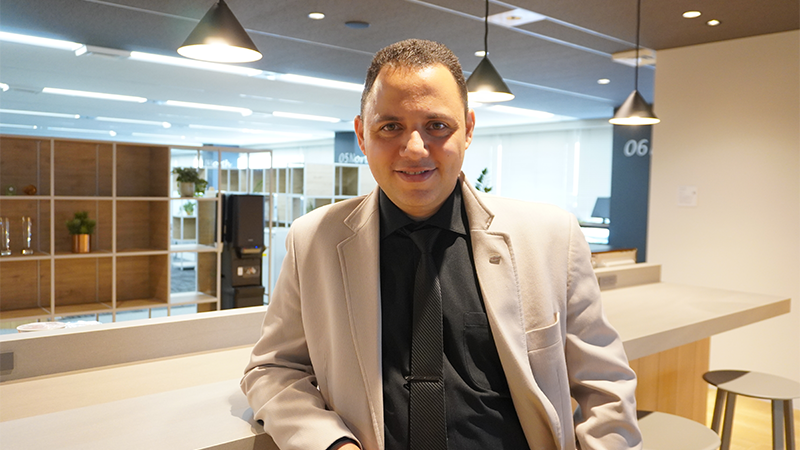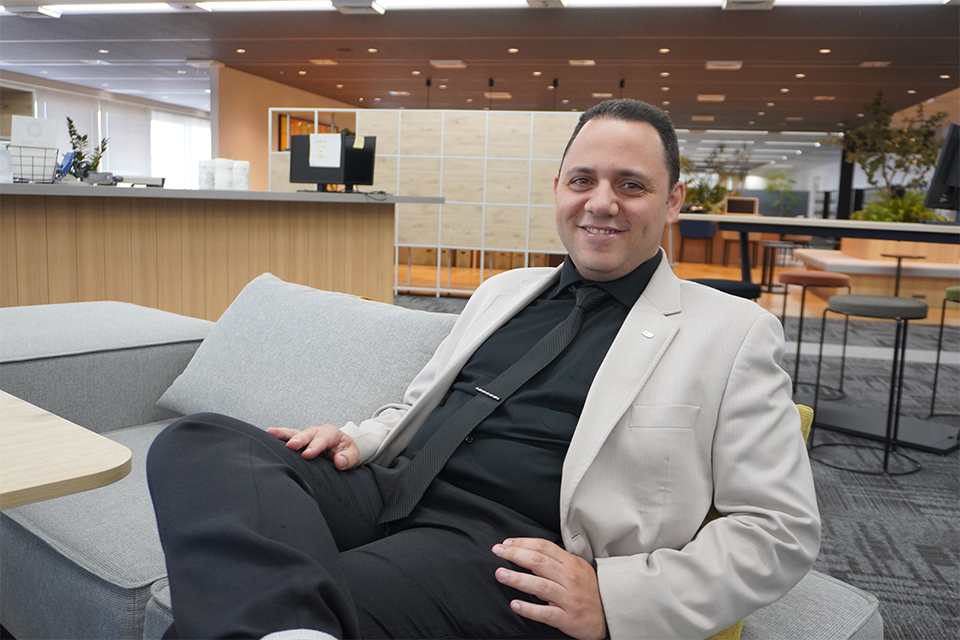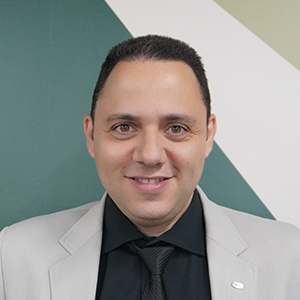Blending two worlds: a quantum researcher’s story of science and culture
Carlos BistafaQuantum Laboratory

A new perspective: using quantum mechanics to solve practical problems
During my undergraduate studies at the Institute of Physics, University of São Paulo (USP), I initially considered becoming an astrophysicist. This stemmed from my high school experience with an outstanding physics and math teacher, a Peruvian immigrant, sparked my interest in physics with his well-prepared blackboard explanations and patient guidance through concepts and formulas.
However, at the beginning of my third year, everything changed. I had my first contact with quantum physics in an introductory course taught by Prof. Sylvio Canuto (former Vice President for Research at USP and current President of the Brazilian Physical Society). It was my first exposure to quantum mechanics, and I finally learned about wave-particle duality, tunneling, the “zombie cat of the scientist with the hard-to-pronounce name” (Schrödinger’s cat), and how Nature can play dice.
At the end of one of his lectures, he put a challenging question to us: "Schrödinger's equation has no explicit dependence on temperature. How would you include its effect?". I thought that this was a great question. It made me realize that by combining quantum mechanics, which doesn't account for temperature, with statistical mechanics —a discipline that deals with the relationship between heat and matter at microscopic level —we might be able to describe the real world more accurately. I was fascinated by the idea and this passion connected me to my lifelong research subject: applying various field like quantum mechanics, statistical mechanics and computational simulation to solve practical problems.
Advancing quantum applications: bridging Fujitsu Research and Fujitsu Research of Europe
After my Ph.D. graduation and years of working as a researcher at top-ranked Japanese universities, I began seeking opportunities to develop new quantum computer applications for chemistry and material science. Fujitsu, in collaboration with RIKEN and other partners, established an industry-academia consortium to develops the Japanese quantum computer. At that time, the consortium had just announced the 64-qubit superconducting quantum computer (now we already have 256-qubit!). From that moment, I knew Fujitsu Research was the place to go if I wanted to work on the quantum computer project.
Since joining the company, I have been focusing on two main tasks. First, I work with partners from other Japanese companies interested in developing and using quantum technology to solve their own problems related to chemistry, material science or drug discovery. Quantum computing has just been born, so it is important to work with other companies to understand the specific problems they are facing and how we can best utilize quantum technology to fit their needs, particularly if we want to provide a robust and useful hybrid quantum computing platform (a platform enables optimal quantum computing by linking superconducting quantum computer and quantum simulator) for partners and customers in the near future.

My other task is related to the globalization efforts of our company. I have been acting as a bridge connecting Fujitsu Research and Fujitsu Research of Europe (FRE) to foster collaborations in the field of quantum applications. FRE has a great team of experts in quantum computing and software development, and I have joined the effort to deploy their recently developed technology in Japan and use it with our partners. We have biweekly meetings where we discuss software development, and I provide feedback and suggestions from a user-base perspective, aiming to improve it to make it more convenient and user-friendly for researchers at Fujitsu Research and our partners. I also act as an interpreter or translator from English to Japanese and vice-versa when I detect that communication does not go smoothly enough, or if someone asks for help. We also have a number of ongoing scientific collaboration projects. We recently finished developing a new application for quantum computing, with publication of our article in a peer-reviewed journal.
It is very satisfying to see that we are able to meet our partners' expectations, and it is a ton of fun to work in an international setting. I am very communicative, and at the end of the day, nothing brings me more satisfaction than to help reduce the language and cultural barrier between Japan and the West, and to see Japanese and foreign colleagues moving together towards a common goal.
Two passions: languages and gaming
I have two hobbies. I enjoy studying foreign languages. I am a native Brazilian Portuguese speaker and fluent in English, Spanish, and Japanese. Currently, I am working on memorizing more Chinese characters to raise my Japanese-Language Proficiency Test certification. I believe that when we learn a new language, we learn new dimensions and nuances of human thinking, because the language reflects the culture and influences it. This helps me think about how a problem would be approached from both the Japanese and Western perspectives and how to find the best outcome by exploring them.
My other hobby is gaming, both modern and retro. When gaming I frequently use several strategies common to research. I am very systematic in exploring every corner of the environment looking for secrets, I take notes of possible points of interest to revisit later, make a “to do” list related to quests, and organize the schedule of what I will play throughout the year. I also love to solve riddles and puzzles, which are very good for keeping the mind sharp. Games that attempt to recreate historical settings accurately have sparked my interest in different periods of human history and civilizations, ranging from ancient Egypt and Greece, through the Middle Ages and Renaissance, to Sengoku and Bakumatsu. Now I have finished over 850 games, own a collection of consoles, handhelds, and have built my own gaming PC.

Pioneering quantum applications in chemistry and materials
During my childhood, once I had a better understanding of what a scientist actually was, I started reading popular science magazines. When NASA began talking about the possibility of a manned mission to Mars, I had no doubt: I told everyone I wanted to study science, work at NASA, and apply for the mission. I was going to be an astronaut and set foot outside our planet! Today, walking on Mars surface is just a sweet childhood dream, but my passion for science has never faded.
I am a big fan of Ayrton Senna. I have always considered him one of the greatest Brazilians of all time. His determination in races, impossible overtaking maneuvers, his victories against all odds, and constant pursuit of improvement and excellence make him a model for Brazilians working abroad. Like him, I strive to improve myself continuously and become the best professional I can possibly be. Similarly, I hope to "drive" our hybrid quantum computing platform, made with Japanese hardware and European software, towards the victory of quantum advantage (refers to the ability of a quantum computer to solve a problem that is practically impossible for a classical computer).
Now, I aspire to become a highly respected researcher in the field of quantum applications, particularly applications involving molecules and materials. I also aim to find an effective way to integrate our recently developed quantum computer with our extensive expertise in high-performance computing, thereby introducing a new computational paradigm to computational chemistry.
Messages from colleagues
Carlos Bistafa is a core member of our team, proficient in both computational chemistry and languages. His consistently cheerful demeanor and his forward-thinking approach to research, always with Fujitsu's future in mind, are truly dependable. He is a respected colleague who reminds us not only of the importance of knowledge but also of the joy of research and the power of a positive attitude. (Ayano Hasome, Principal Researcher, Quantum Laboratory, Fujitsu Limited)
Carlos Bistafa is a talented and motivated researcher and takes on new problems with both enthusiasm and scientific curiosity. He is based in Kawasaki and has contributed significantly to joint projects, including with the team in Europe, domestically and across international borders. Besides his technical ability, another of Carlos' strengths is his ability to explain complicated topics coherently to audiences of varying expertise. We look forward to working with him more in the future. (Josh Kirsopp, Principal Researcher, Fujitsu Research Europe)

Titles, numerical values, and proper nouns in this document are those reported when this interview was made.




